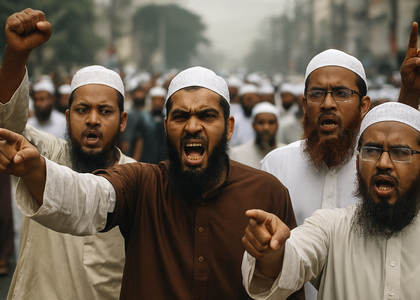ISI’s Bangladesh blueprint: Jamaat and Hefazat push country towards Talibanisation
By IANS | Updated: September 4, 2025 18:50 IST2025-09-04T18:50:03+5:302025-09-04T18:50:27+5:30
New Delhi, Sep 4 The enforced regime change in Bangladesh was meant to take the country in the ...

ISI’s Bangladesh blueprint: Jamaat and Hefazat push country towards Talibanisation
New Delhi, Sep 4 The enforced regime change in Bangladesh was meant to take the country in the right direction. However, under the leadership of Muhammad Yunus, almost everything, including human rights and women’s rights, seems to be on a downward trajectory.
Until the COVID-19 pandemic, the country was making gains in terms of economic development. Moreover, the country had also offered social stability. Yunus, who has been labelled by many as a puppet of the Jamaat-e-Islami, has fallen for the Pakistan trap. Intelligence agencies had said that the ISI wants Bangladesh to return to the pre-1971 era.
In a very short span of time, that has been taking place. There is scant regard for women’s rights, and the protection of the minorities is a foregone conclusion. With radical Islamist groups controlled by the Jamaat calling the shots, a Taliban styled moral policing is fast taking over. Women who are dressed immodestly are being shamed in public. There have been instances of women being assaulted for not dressing properly.
One of the groups that is leading the implementation of the Taliban styled regime is the Hefazat-e-Islam (HeI). It wants the women to be subdued and has been opposing all proposals that speak about women’s rights. The HeI has made it clear that men and women cannot be equal. It has taken out protest marches opposing the reforms recommended by the Women’s Affairs Reform Commission.
The reforms it has been opposing are the recommendation to criminalise marital rape, ensure the equal rights of women regardless of their religion, ethnicity and class, provide for equal parental rights for women, protect women’s rights to inheritance, increase women’s parliamentary representation, protect the rights of the sex workers, build a gender based violence free society and empower women through education and skill development.
The HeI has long pushed to Talibanise Bangladesh and ensure that women are not equal to men. Owing allegiance to the ISI and Jamaat, it has made its anti-India stance clear. In 2021, members of the HeI clashed with Awami League supporters who were trying to prevent a protest against Prime Minister Narendra Modi. They wanted to wave slippers at the Indian PM, but clashes broke out with the then-ruling party, Awami League, who tried to prevent the same.
Indian agencies say that since the fall of the Sheikh Hasina government, the rise of the HeI has been rapid. The outfit, which had gradually turned moderate a few years back, is now as radical as ever. While the Yunus government has tried on some occasions to push for reforms, the Jamaat has unleashed the HeI against the same.
While the HeI has denied any link with the Jamaat, the allegation is that the outfit’s primary intention is to derail the International Crimes Tribunal for the war crimes committed in 1971.
The HeI appears to have a pattern and sends out confusing signals to the security agencies. Maualana Habibur Rehman, a madrasa principal of Sylhet and one of the organisers of the HeI’s May 5, 2013, protests, had claimed that he met with Osama Bin Laden and members of the Harkat-ul-Jihad al-Islami. However, some other HeI leaders have condemned Al-Qaeda and said that this outfit would never be successful in Bangladesh. This could be a ploy on the part of the HeI to avoid scrutiny and get banned.
The HeI was formed in 2010 to oppose the Sheikh Hasina government’s Women’s development policy, which promised equal rights to property for women. Today, with Hasina out of the picture, the outfit is back to its demands. This time, however, it has the complete backing of the Jamaat, which calls the shots in the ruling dispensation.
With the return of these hardliners and the Yunus government unable to control them, Bangladesh runs the risk of becoming a Talibanised state.
--IANS
vicky/dan
Disclaimer: This post has been auto-published from an agency feed without any modifications to the text and has not been reviewed by an editor
Open in app